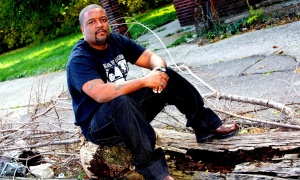
If you had to work full-time and care for a family member while being a married or single college student, what would your life look like? As part of a series on nontraditional students this semester, College of Education, Health, and Human Services student Robin Morris-Wilson investigates what it means to be a nontraditional student at University of Michigan-Dearborn through a student narrative lens.
He has spoken at Harvard University, Stanford University and other respected institutions of higher education and community organizations. And his community work and life story have been featured in local and national media.
In December 2017, Shakur will graduate from University of Michigan-Dearborn with a bachelor’s degree in liberal studies with a concentration in African American studies, psychology and sociology. And while he has experienced incredible personal and academic success, Shakur’s path to success was not always straight.
“Growing up in Detroit, I did not find school appealing. I never graduated from anything. I was just pushed through,” Shakur said. He said he co-founded the gang Zone 8 in Detroit at the age of 13. He was expelled from Detroit Public Schools for his gang involvement.
At 19, he was convicted and sentenced to serve five to 15 years in prison for a crime he said he did not commit. It was in prison where he first met his father, who was also incarcerated. But it was in prison where he said his thirst for knowledge flourished. “I developed a relationship with my father and I learned from him the lessons of redemption, transformation and the importance of valuing knowledge and education. I grew an undying love for books,” Shakur said.
Shakur said his love for books led him back to school. In January of 2001, he was released from prison. And in 2005, he enrolled at Wayne County Community College, where he earned an associate degree in liberal arts. “After graduating, I desperately wanted to continue my education,” Shakur said.
He started taking college courses at different universities to earn credits toward a bachelor’s degree. However, he said he did not care for the learning environments, adding “I felt out of place and ultimately dropped out.”
Next, he did something that most people would not think to do. In 2008, Shakur self-published a memoir The Window 2 My Soul, which has been adapted to be used as a curriculum guide at different universities. Since then, he has authored other books that include: My Soul Looks Back, the sequel to his first memoir; Scribes of Redemption, a collection of letters and lessons from his father; and Redemptive Soul: The Yusef Bunchy Shakur Reader.
In 2009, Shakur co-founded the Urban Network in his neighborhood, which operated as a bookstore and community center providing literacy classes, digital training and a platform for local and national speakers and authors. The organization was forced to close four years later.
Additionally, for the past 10 years, he has organized the annual Restoring the Neighbor Back To the Hood Backpack Giveaway at his mother’s house, which has provided more than 5,000 Detroit children with backpacks and school supplies.
Shakur said his community work afforded him the opportunity to meet UM-Dearborn Professor Liz Rohan, who told him about the university’s SOAR program, which provides a wide range of support for nontraditionally aged individuals experiencing socioeconomic challenges who wish to begin or resume their post-secondary education.
At the professor’s advisement, Shakur attended SOAR’s On the Move Workshop in the spring of 2014. Following the workshop, he scheduled a meeting with SOAR Director Ellen Judge-Gonzalez.
He said the SOAR program aided him in identifying resources to help him move closer to his goal of earning his bachelor’s degree. “I felt at home here because of the SOAR program,” Shakur said. “The SOAR program never abandoned me, it helped me navigate the rough waters when I felt like I was drowning."
Shakur said when he is not in classes or meeting with professors, he is focused on his work in the community. “I am always in the trenches. So, I find myself doing the ugly work of breaking up fights, helping get resources to those who are surviving in desperate circumstances, or providing counsel to guys who are ready to strike revenge on somebody. I encourage them to take the high road,” he said.
He also frequently accepts invitations to speak at local and national community organizations, churches and universities. Additionally, he organizes and manages different neighborhood events. He also constantly fundraises to support work in transforming an abandon house into a community center in his neighborhood.
“It means a lot to be a UM-Dearborn student because of how the world tries to write off nontraditional students,” Shakur said. “We are contributing to the social force of dismantling the stereotypes that are associated with nontraditional students.”
In the future, Shakur plans to use his UM-Dearborn degree to complement his existing accomplishments. “I will use it as a stepping stone to work toward obtaining my master’s degree and Ph.D.,” Shakur said. “Obtaining a UM-Dearborn degree is personal because it is a goal that I set out to accomplish. When I graduate, I hope to inspire others to pursue their education despite roadblocks. Education makes us powerful. Without it, we remain powerless.”





